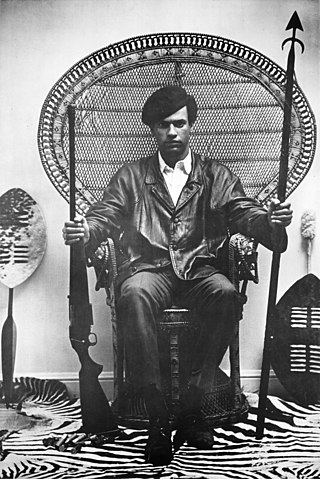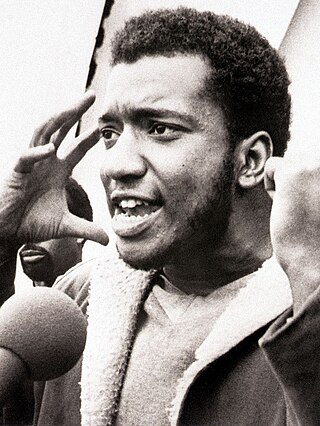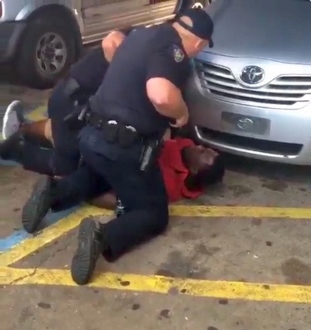
Leroy Eldridge Cleaver was an American writer and political activist who became an early leader of the Black Panther Party.

Huey Percy Newton was an African American revolutionary and political activist who founded the Black Panther Party. He ran the party as its first leader and crafted its ten-point manifesto with Bobby Seale in 1966.

The New Black Panther Party (NBPP) is an American black nationalist organization founded in Dallas, Texas, in 1989. Despite its name, the NBPP is not an official successor to the Black Panther Party. Members of the original Black Panther Party have insisted that the new party has no legitimacy and "there is no new Black Panther Party".

Fredrick Allen Hampton Sr. was an American activist. He came to prominence in his late teens and very early 20s in Chicago as deputy chairman of the national Black Panther Party and chair of the Illinois chapter. As a progressive African American, he founded the anti-racist, anti-classist Rainbow Coalition, a prominent multicultural political organization that initially included the Black Panthers, Young Patriots, and the Young Lords, and an alliance among major Chicago street gangs to help them end infighting and work for social change. A Marxist–Leninist, Hampton considered fascism the greatest threat, saying "nothing is more important than stopping fascism, because fascism will stop us all."

The black power movement or black liberation movement was a branch or counterculture within the civil rights movement of the United States, reacting against its more moderate, mainstream, or incremental tendencies and motivated by a desire for safety and self-sufficiency that was not available inside redlined African American neighborhoods. Black power activists founded black-owned bookstores, food cooperatives, farms, media, printing presses, schools, clinics and ambulance services.

Alprentice "Bunchy" Carter was an American activist. Carter is credited as a founding member of the Southern California chapter of the Black Panther Party. Carter was shot and killed by a rival group, Ron Karenga's "Us", and is celebrated by his supporters as a martyr in the Black Power movement in the United States. Carter is portrayed by Gaius Charles in the 2015 TV series Aquarius.

Black anarchism, also known as New Afrikan anarchism or Panther anarchism, is an anti-authoritarian and anti-racist current of the Black power movement and anarchism in the United States. It is characterized by its intersectional analysis of different forms of oppression, its skepticism of both authoritarian socialism and Eurocentric anarchism, and its advocacy of community organizing, armed self-defense and revolutionary black nationalism.

Kuwasi Balagoon, born Donald Weems, was an American political activist, anarchist and member of the Black Panther Party and Black Liberation Army. Radicalised by race riots in his home state of Maryland growing up, as well as by his experiences while serving in the US Army, Weems became the black nationalist known as Kuwasi Balagoon in New York City in the late 1960s. First becoming involved in local Afrocentric organisations in Harlem, Balagoon would move on to become involved in the New York chapter of the Black Panther Party, which quickly saw him charged and arrested for criminal behaviour. Balagoon was initially part of the Panther 21 case, in which 21 panthers were accused of planning to bomb several locations in New York City, but although the Panther 21 were later acquitted, Balagoon's case was separated off and he was convicted of a New Jersey bank robbery.
Denis P. Walker, also known as Bejam Kunmunara Jarlow Nunukel Kabool, was an Aboriginal Australian activist. He was a major figure in the civil rights and land rights movements of the 1970s and continued to fight for a treaty between the Australian Government and Aboriginal nations through the 1990s and until his death.

The New Panther Vanguard Movement (NPVM), originally known as the New African American Vanguard Movement (NAAVM) was created in South Central Los Angeles in 1994 as a response to the Los Angeles riots of 1992. Former members of the Black Panther Party and other community activists came together after the riots and shared their frustration with the lack of leadership in the Black community. After various dialogues, they decided to create a grassroots organization that would reflect the vision and community spirit of the Black Panther Party.

Emory Douglas is an American graphic artist. He was a member of the Black Panther Party from 1967 until the Party disbanded in the 1980s. As a revolutionary artist and the Minister of Culture for the Black Panther Party, Douglas created iconography to represent black-American oppression.

The Black Panther Party was a Marxist–Leninist and black power political organization founded by college students Bobby Seale and Huey P. Newton in October 1966 in Oakland, California. The party was active in the United States between 1966 and 1982, with chapters in many major American cities, including San Francisco, New York City, Chicago, Los Angeles, Seattle, and Philadelphia. They were also active in many prisons and had international chapters in the United Kingdom and Algeria. Upon its inception, the party's core practice was its open carry patrols ("copwatching") designed to challenge the excessive force and misconduct of the Oakland Police Department. From 1969 onward, the party created social programs, including the Free Breakfast for Children Programs, education programs, and community health clinics. The Black Panther Party advocated for class struggle, claiming to represent the proletarian vanguard.
The Rainbow Coalition was an anti-racist, working-class multicultural movement founded April 4, 1969, in Chicago, Illinois by Fred Hampton of the Black Panther Party, along with William "Preacherman" Fesperman of the Young Patriots Organization and José Cha Cha Jiménez, founder of the Young Lords. It was the first of several 20th-century black-led organizations to use the "rainbow coalition" concept.

Revolutionary Suicide is an autobiography written by Huey P. Newton with assistance from J. Herman Blake originally published in 1973. Newton was a major figure in the American black liberation movement and in the wider 1960s counterculture. He was a co-founder and leader of what was then known as the Black Panther Party (BPP) for Self-Defence with Bobby Seale. The chief ideologue and strategist of the BPP, Newton taught himself how to read during his last year of high school, which led to his enrollment in Merrit College in Oakland in 1966; the same year he formed the BPP. The Party urged members to challenge the status quo with armed patrols of the impoverished streets of Oakland, and to form coalitions with other oppressed groups. The party spread across America and internationally as well, forming coalitions with the Vietnamese, Chinese, and Cubans. This autobiography is an important work that combines political manifesto and political philosophy along with the life story of a young African American revolutionary. The book was not universally well received but has had a lasting influence on the black civil rights movement.
The Black Riders Liberation Party (BRLP) is a revolutionary black power organization based in the United States. The group claims ideological continuity with the original Black Panther Party for Self-Defense and, according to its official website, organizes gang members to "stop commiting [sic] genocide against each other and to stand up against white supremacy and capitalist oppression."

On July 5, 2016, Alton Sterling, a 37-year-old black man, was shot and killed by two Baton Rouge Police Department officers, Blane Salamoni and Howie Lake II, in Baton Rouge, Louisiana. The officers, who were attempting to control Sterling's arms, shot Sterling to death, which was preceded by Salamoni threatening Sterling with his gun before Sterling was restrained, yelling that he would "shoot [Sterling] in the fucking head" if he moved. Police alleged that Sterling had reached for the loaded handgun in his pants pocket. Police were responding to a report that Sterling was selling CDs and that he had used a gun to threaten a man outside a convenience store. The owner of the store where the shooting occurred said that Sterling was "not the one causing trouble" during the situation that led to the police being called. The shooting was recorded by multiple bystanders.

The Revolutionary People's Constitutional Convention (RPCC) was a conference organized by the Black Panther Party (BPP) that was held in Philadelphia from September 4–7, 1970. The goal of the Convention was to draft a new version of the United States Constitution and to unify factions of the radical left in the United States. The RPCC represented one of the largest gatherings of radical activists across movements and issues in the United States. The Convention was attended by a variety of organizations from the Black Power Movement, Asian American Movement, Chicano Movement, American Indian Movement, Anti-war movement, Women's Liberation, and Gay Liberation movements. Estimates of attendance range from 6,000 to 15,000. Attendees convened in workshops to draft declarations of demands related to various issues, which were ultimately intended to be incorporated into a new constitution which would function as the final vision of those movements. The RPCC also signified a shift in BPP focus from black self-defense to a broader revolutionary agenda. While conflicts did arise during the Philadelphia Convention, the conference was ultimately deemed a success by the Panthers. After the Philadelphia conference, attempts were made to reconvene to finalize and ratify the new constitution in Washington, DC a few months later but ultimately failed due to police interference and Panther disorganization.
Alli Muhammad is an African-American doctor, psychologist, political activist and revolutionary who founded the Revolutionary Black Panther Party, which claims continuity from the Black Panther Party of 1966, the RBPP was officially named in 1992.

Predictions of a genocide in Ethiopia, particularly one that targets Tigrayans, Amharas and/or Oromos, have frequently occurred during the 2020s, particularly in the context of the Tigray War and Ethiopia's broader civil conflict.
















